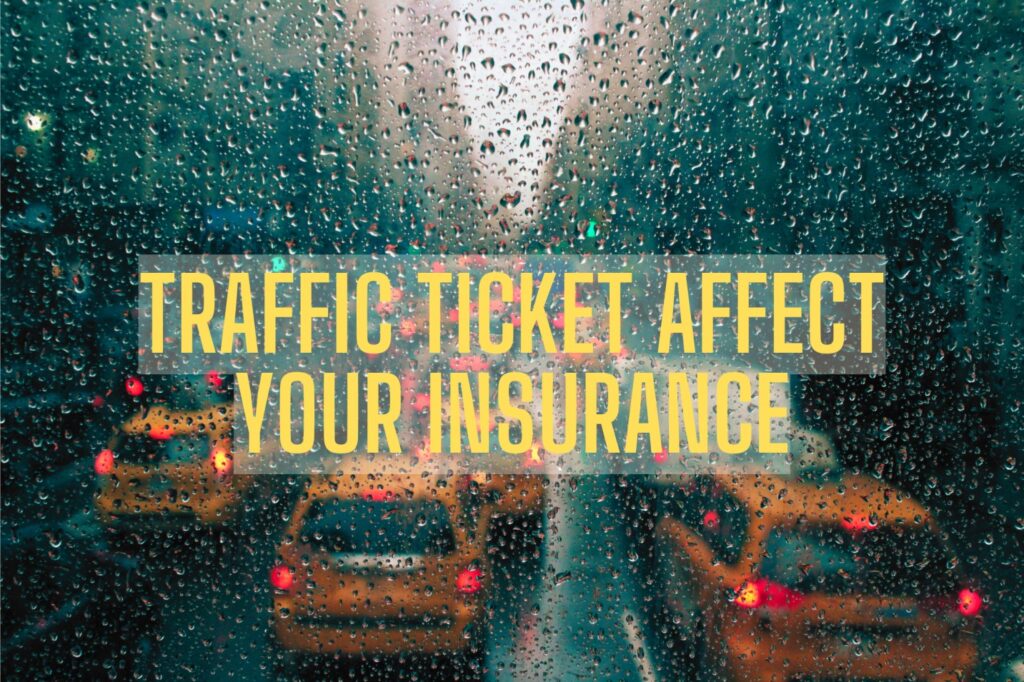Nobody likes getting a traffic ticket. Whether it’s for speeding, running a red light, or not yielding, it can be frustrating and expensive. On top of paying the fine, many drivers worry that a ticket will make their car insurance more expensive.

Yes, traffic tickets can affect your insurance rates, but how much they change depends on several factors. In this article, we’ll explain how tickets impact your insurance, which violations are the worst, and how you can reduce the effects.
Contents
How Traffic Tickets Affect Insurance Rates
Car insurance companies decide your rates based on how risky you are as a driver. Studies show that people with traffic tickets are more likely to have accidents, making them a bigger risk to insure. When you get a ticket, your insurance company sees you as a higher-risk driver, which can lead to higher rates.
The impact of a traffic ticket on your insurance depends on:
- The Severity of the Violation: Minor infractions, such as a broken taillight, may not affect your rates at all. However, more serious violations, like speeding, reckless driving, or driving under the influence (DUI), can significantly increase your premiums.
- Your Driving History: If you have a clean driving record, a single ticket might not cause a drastic rate hike. However, if you have multiple violations or a history of accidents, the impact will be more severe.
- Your Insurance Provider: Different insurance companies handle traffic tickets differently. Some may forgive a first offense, while others have stricter penalties and higher rate increases.
- State Laws: Insurance rules differ by state. Some states don’t report certain violations to insurers unless they lead to an accident or conviction.
Types of Traffic Violations and Their Impact
Not all traffic tickets are created equal. Here’s a breakdown of common traffic violations and how they might affect your insurance:
- Speeding Tickets: Speeding is a common traffic violation, and its impact on your insurance depends on how fast you were going. A minor ticket, like driving 10 mph over the limit, may lead to a small increase. However, going 20 mph or more over the limit can result in a much higher rate hike.
- Reckless Driving: Distracted driving is a serious violation that often leads to a big increase in insurance rates. Insurance companies consider it a major risk because it increases the chances of an accident.
- Running a Red Light or Stop Sign: These violations are considered dangerous because they increase the risk of accidents. As a result, they can lead to higher insurance rates.
- Distracted Driving (e.g., Texting While Driving): With more people using devices, insurers are especially concerned about distracted driving. If you get a ticket for texting or using your phone while driving, your insurance rates could increase significantly.
- Driving Under the Influence (DUI): A DUI is one of the most serious violations and can greatly impact your insurance. In addition to much higher rates, you may need to file an SR-22 form to prove you have the required minimum coverage.
- Parking Tickets: Parking tickets usually don’t affect your insurance since they aren’t moving violations. However, if you don’t pay them, you could face issues like a suspended license, which might indirectly impact your insurance rates.
How Much Will Your Insurance Increase?
How much your insurance increases after a traffic ticket depends on several factors. A single speeding ticket can raise your rates by 20–30%, while serious offenses like a DUI Charge can cause a 50% or higher increase. In some cases, your insurer may even choose not to renew your policy.
Here are some examples to understand how tickets affect your insurance:
- Minor Speeding Ticket: A 20% increase on a $1,200 premium would add $240, making your total $1,440.
- Reckless Driving: A 50% increase would add $600, raising your premium to $1,800.
- DUI: A 100% increase would double your rate to $2,400.
How Long Will a Ticket Affect Your Insurance?
In most states, traffic tickets stay on your record for three to five years and can affect your insurance rates during that time. However, the impact usually decreases over time, especially if you maintain a clean driving record.
Tips to Minimize the Impact of a Traffic Ticket
If you get a traffic ticket, there are things you can do to keep your insurance rates from going up:
- Contest the Ticket: If you believe the ticket was unfair, you can challenge it in court. If you win, the violation may be removed from your record, preventing any impact on your insurance rates.
- Take a Defensive Driving Course: Taking a defensive driving course can help lower or remove the impact of a ticket in some states and with certain insurers. It also shows your insurance company that you’re committed to safe driving.
- Find the Best Insurance Deal: If your insurance company raises your rates significantly, consider shopping for a new policy. Some insurers are more lenient about traffic violations than others, which could help you find a better rate.
- Maintain a Clean Record: Avoiding more violations can prevent further rate increases. Over time, as the ticket is removed from your record, your insurance rates may decrease.
- Ask About Forgiveness Programs: Some insurance companies have accident or violation forgiveness programs that prevent your rates from increasing after a first-time offense.
Conclusion
Yes, a traffic ticket can increase your car insurance rates, but the amount depends on the violation, your driving history, and your insurer. Minor offenses may cause a small increase, while serious violations like reckless driving or a DUI can raise rates significantly. Understanding how tickets impact insurance and taking steps to minimize their effects can help you keep costs low. The best way to avoid higher rates is to drive safely and follow traffic laws.